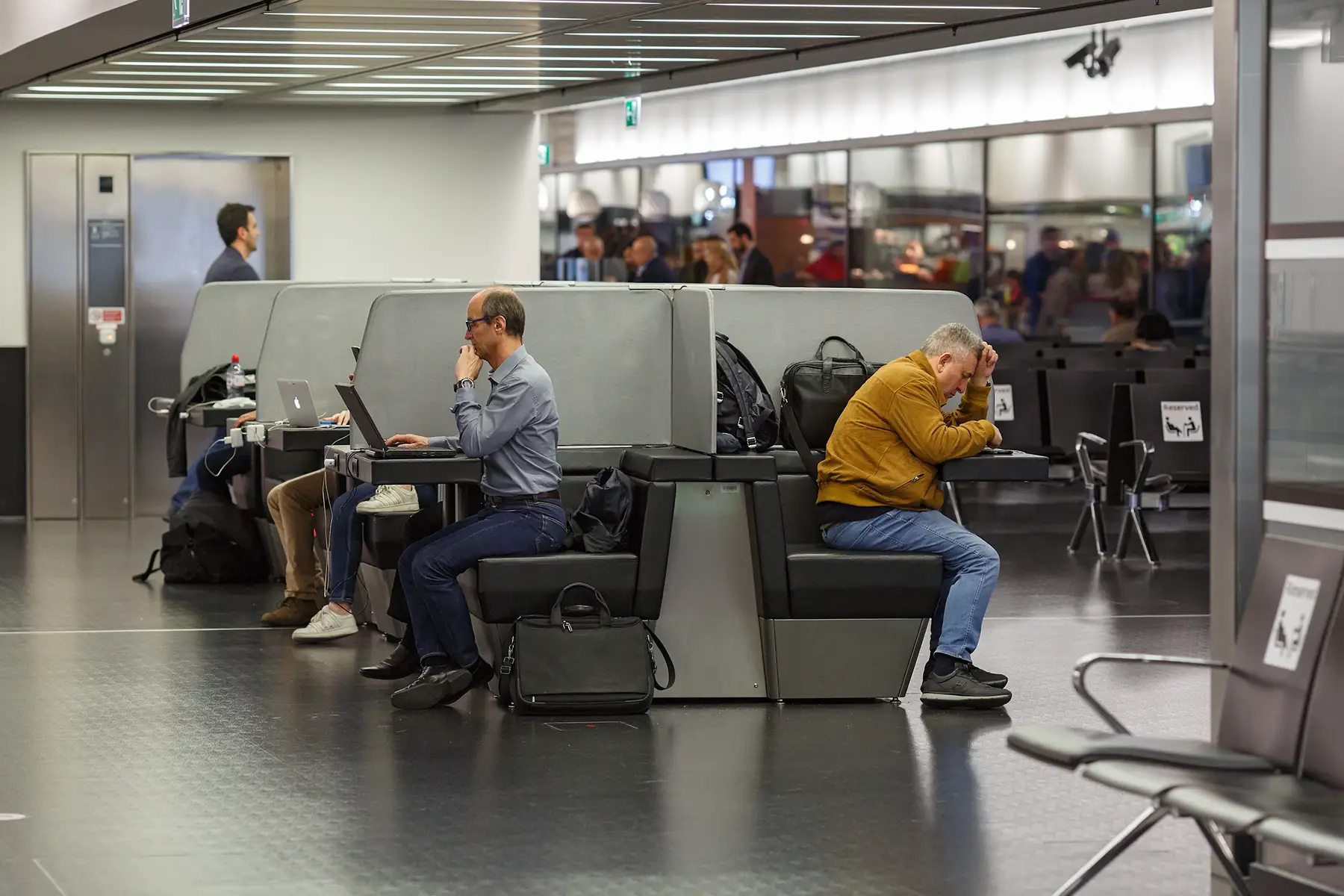For expats, working in Austria means access to a stable and prosperous job market with opportunities across a range of industries. Known for its strong economy and emphasis on innovation, Austria has plenty of roles in fields like technology, engineering, tourism, and healthcare.
While German proficiency can be very helpful, international companies and startups increasingly value English-speaking professionals and actively hire foreign talent.
Get started on finding a job in Austria by reading the following:
- The job market in Austria
- How to find jobs in Austria
- Assistance looking for employment in Austria: AMS
- How do you apply for a job in Austria?
- What are the requirements to find work in Austria?
- Financial support while looking for a job in Austria
- Starting your job in Austria: important questions
- Useful resources
Coursera
Boost your career with Coursera. This online learning platform lets individuals and organizations learn new job-relevant skills. They partner with over 275 leading universities and companies to offer flexible, affordable courses. From hands-on projects to certificates and degree programs, start your learning journey today with Coursera.
The job market in Austria
Austria’s job market in 2025 is experiencing moderate growth, with certain sectors such as technology, healthcare, and engineering showing increased demand for skilled professionals.
The unemployment rate has seen a slight uptick, rising from 4.99% in 2022 to 5.24% in 2023. Youth unemployment remains a concern, with rates around 10.93% in 2023.

Job seekers face competition, particularly in saturated industries, but opportunities exist in fields identified on Austria’s expanded shortage occupation list, which now includes 110 new roles for 2025.
Challenges of working in Austria include navigating the country’s visa requirements and language barriers. Among the positives are benefiting from Austria’s high quality of life and competitive salaries in high-demand professions.
What jobs are in demand in Austria?
Austria’s main industries include:
- Manufacturing
- Tourism
- Agriculture
Skills shortages have been reported in a number of sectors including:
- Healthcare
- Construction
- Information Technology (IT)
- Hospitality
The biggest Austrian companies are:
- OMV Group
- Red Bull GmbH
- Voestalpine AG
- Erste Group Bank AG
- Raiffeisen Bank International AG
In addition to these, multinational companies with a strong presence in Austria include Siemens AG, IBM, Nestlé, and Unilever.
Job vacancies for foreigners in Austria
Austria is an attractive destination for expats, offering a high quality of life, robust economy, and central European location. While Austria offers numerous opportunities and incentives for foreign workers, challenges remain in terms of employment stability and integration into the workforce.

Regarding employment conditions, the unemployment rate for foreign nationals was 10.4% in 2023, higher than the 3.8% rate for Austrian nationals, suggesting that foreign workers may face greater employment challenges. As of January 2023, foreign nationals comprised approximately 19% of Austria’s total population.
To facilitate the employment of skilled foreign workers, Austria has implemented the Red-White-Red Card, a flexible immigration model that provides qualified third-country nationals and their families with a single permit for work and permanent settlement. Additionally, the job seeker (category D) visa allows highly qualified individuals to enter Austria for six months to search for employment.
Finding jobs in Vienna
Finding a job in Vienna as a foreigner offers unique opportunities in the city’s thriving sectors like tourism, international organizations, and technology. Known as a hub for global companies and institutions, Vienna attracts a diverse workforce.
While German proficiency can boost your chances, Vienna’s cosmopolitan nature means that roles in international companies or startups may prioritize other skills.
Networking is particularly important, as many positions are secured through local connections or expat communities. Online platforms like WienWork and Jobs in Vienna are great starting points.
How to find jobs in Austria
Expatica jobs in Austria
You can find suitable openings on the Expatica jobs board, which has a constantly updated list of jobs across Austria.
EURES
If you’re from the EU/EFTA, you can look for a job through EURES, the European Job Mobility Portal, which is maintained by the European Commission. As well as looking for work, you can upload your CV and get advice on looking for work in Austria.
Public job sites
The national unemployment and training office in Austria is the Arbeitsmarktservice (AMS), or Public Employment Service. The AMS provides a range of services to job seekers and employers, including job placement, vocational training programs, career counseling, and unemployment benefits.

The AMS job search portal is the largest in Austria. It offers job listings, resources for job seekers, and information on training opportunities.
Job websites in Austria
There are also various general job websites, including the following:
- Career Jet – the international search engine with a filter for Austria
- Expatica jobs board – advertises a plethora of interesting positions in Austria at various levels
- Indeed – another international site with an Austrian version
- Jobs in Vienna – if you are living in Vienna, this is a great site for finding work, even if you are not German-speaking
- Karriere – a large career portal in Austria
English-speaking jobs
While your best bet at getting a job in Austria is by learning German, there are still possibilities out there for English-speaking jobs.
You can check our Expatica jobs board as well as the English job section of The Local. Another option is to keep an eye on Xpat Jobs for various vacancies for English speakers across several different sectors and industries.
Recruitment agencies
Try these job agencies who recruit employees in Austria:
- Manpower – leading recruitment and temp firm in Austria where you can get your name on the books and let them do the job hunting for you
- Aviteus – specifically recruits specialists and managers in Austria
- Hays – a global recruitment agency that operates across 33 countries with offices in Vienna and Graz
- Michael Page – a professional recruitment consultancy that specializes in placing candidates in permanent, contract, temporary, and interim positions around the world
Foreign language teaching
If you are a teacher or are having difficulty finding an English-speaking position in Austria, teaching English is always an option. Although it is not a huge market like in some other countries, you can still look into it before deciding whether or not to take a TEFL course to get certification.

Here are some English teaching job sites that might be helpful:
- TEFL Jobs Centre – the leading site for English teaching jobs around the world which is updated every week
- Go Overseas – a resource that features several English teaching programs and jobs throughout Austria
Embassies and foreign organizations
Check out opportunities at embassies, consulates, and international organizations in Vienna. Most will expect a high standard of both German and English.
The U.S. Embassy in Vienna posts job openings from time to time, as does the British Embassy. The United Nations has a large presence in Vienna with many local vacancies advertised on their website.
Newspapers
Austrian newspapers are worth checking out to keep an eye on vacancies:
- Der Standard: offers a dedicated job section featuring a variety of vacancies
- Die Presse: includes a career section with job listings for professionals and executives
- Kurier: provides job advertisements both in print and on its online platform under the “Jobs” section
- Kronen Zeitung (Krone): features job listings in its classifieds section and online
Make the first move: speculative applications
There’s no harm in firing off some speculative applications to companies you’d particularly like to work for. Try looking on the company websites to see if they have a vacancies page or contact details where you can send your CV.
Self-employment and freelancing in Austria
Austria offers a range of incentives to support entrepreneurs, freelancers, and self-employed individuals. Through the AWS, the federal development bank provides grants, low-interest loans, and guarantees for innovative startups. Programs like the Venture Capital Initiative attract international venture capital investments for research and technology-focused projects.

Additionally, the Vienna Business Agency supports startups in Vienna through initiatives like the Startup Grant, which offers financial aid alongside coaching, networking, and consultation services.
Austria also offers tax incentives that reduce financial burdens for new businesses. These include deductions, exemptions, and credits tailored to encourage foreign investment and economic activity. To take advantage of these incentives, entrepreneurs must develop a solid business plan, choose an appropriate legal structure, and register their business with Austrian authorities.
Traineeships, internships, and volunteering in Austria
University graduates can find EU-based traineeships via the European Commission Traineeships Office (Bureau de Stages); otherwise, you can search for internships and placements on AIESEC (for students and recent graduates in the UK) or IAESTE (for students in science, engineering, and applied arts). Internships can also be found at Globalplacement and Intern Abroad.
For those aged between 17 and 30, you can find volunteer programs at the European Voluntary Service (EVS), where you work abroad for up to 12 months in exchange for board, food, insurance, and a small allowance. Concordia is another organization for volunteer opportunities. For holiday volunteering opportunities, check Workaway.
Assistance looking for employment in Austria: AMS
The Arbeitsmarktservice (AMS) helps foreign workers integrate into the Austrian labor market through various targeted initiatives. These include personalized career counseling to help individuals navigate the local job market and tailor their applications to Austrian standards.
AMS also provides access to subsidized German language courses, which are essential for many jobs, and assists in assessing and validating foreign qualifications to align with local standards.

For those looking to enhance their skills, AMS offers vocational training and up-skilling programs in high-demand sectors such as healthcare, IT, and construction. Employers are encouraged to hire foreign workers through financial subsidies, fostering workplace integration. AMS also facilitates job placement through online job portals, fairs, and networking events.
How to apply for AMS assistance
To access AMS resources, foreign workers need to register with the service, either online or at a local office, and provide valid residence permits and work authorization. After an initial consultation with an AMS counselor, they can explore language training, courses, and job opportunities suited to their qualifications and career goals.
How do you apply for a job in Austria?
To apply for a job in Austria, ensure your application is tailored and complete. Submit a concise resume (one to two pages) with a clear structure, including personal details (photo optional but common), work experience, education, skills, and languages. Highlight relevant achievements and tailor your CV to the job requirements.
It might be worth checking out a resume builder like resume.io to make sure you’ve got yours just right for sending out to Austrian employers.
Include a cover letter addressed to the hiring manager, explaining why you are suited for the role and what value you bring to the company. Attach references (with permission) from past employers or colleagues and copies of relevant diplomas or certifications. Ensure all documents are well-organized and professionally formatted, as presentation is highly valued in Austria.
The interview process in Austria typically includes one to two rounds, with a focus on professionalism and cultural fit. Be punctual, dress formally, and prepare thoroughly by researching the company and practicing answers to common questions. Interviews often begin with an introduction about the company, followed by detailed discussions about your skills, experience, and motivation for applying.
Some roles may require additional assessments, such as technical tests or case studies. At the end of the interview, you are encouraged to ask questions about the role or company, as this demonstrates genuine interest.
What are the requirements to find work in Austria?
1. Do you need an Austrian work visa?
EU/EEA citizens do not require a work visa or permit to work in Austria. They have free access to the labor market as long as they register with local authorities after arriving.

For third-country nationals, there are several types of visas available to those who want to get a job in Austria. Here are the main ones:
- Red-White-Red Card: for highly skilled workers, key workers, and other qualified professionals
- Job seeker visa: for highly qualified individuals to search for jobs within six months
- EU Blue Card: for non-EU nationals with high qualifications and above-average salaries
- Short-term employment visa: for temporary work or seasonal jobs
2. What are the language requirements to work in Austria?
Speaking German is generally important for finding a job in Austria, as it is the primary language used in the workplace. Many roles, especially in customer-facing or administrative positions, require at least conversational German proficiency.
If language is a barrier, Austria offers many institutions providing German language classes to help integrate into the job market. Your options for learning German include:
- ÖIF (Austrian Integration Fund): offers German courses tailored for migrants and job seekers
- DeutschAkademie: provides intensive German courses in Vienna, Linz, Salzburg, and online
- Volkshochschule (VHS): local adult education centers offering affordable language classes across Austria
- Private tutors and online platforms: services like Babbel, LanguaTalk, or Lingoda for flexible learning options
3. Can you transfer your qualifications to work in Austria?
To transfer your qualifications to work in Austria, you’ll need to ensure they are officially recognized, depending on your field and profession.
Most major European countries, including Austria, are part of the Bologna Process, meaning qualifications from participating countries are generally recognized. If your country is not signed up, you should contact the Austrian Federal Ministry of Education, Science, and Research (BMBWF) for guidance on credential recognition and equivalency assessments.

For regulated professions in Austria, you must verify whether specific qualifications are required. You can check the European Commission’s Regulated Professions Database to see if your profession requires official recognition or additional certification to practice in Austria.
If your profession is not regulated, employers often accept foreign qualifications directly, but it’s helpful to provide a clear translation of your credentials and diplomas.
4. You will need a tax and social security number
Foreign workers must also register with local authorities within three days of moving to Austria, obtaining a Meldezettel (registration form) as proof of residence. National IDs or residence permits can be obtained through local municipal offices (Gemeindeamt or Magistrat) or immigration authorities, depending on citizenship or residency status.
For employees, employers typically handle your tax registration by submitting necessary details to the local tax office (Finanzamt). Employees will then receive their tax number automatically.
Self-employed individuals and freelancers must register directly with the local tax office. This involves submitting personal details, proof of residency, and documentation about your business or freelance activity.
Financial support while looking for a job in Austria
Austria has a robust social security system that includes unemployment benefits for eligible individuals. To qualify, you must have worked and contributed to unemployment insurance for at least 52 weeks within the past two years (or 26 weeks for those under 25). Benefits are calculated based on previous earnings and typically require registration with the AMS as a job seeker.
EU/EEA citizens may transfer unemployment benefits from their home country to Austria using the U2 or S1 form, allowing continuity of support while job hunting. For those who don’t meet these requirements, contacting local social welfare offices or NGOs specializing in migrant support can help identify alternative financial assistance options.
Starting your job in Austria: important questions
When starting a job in Austria, it’s important to understand the types of employment contracts and probation periods. Contracts are typically permanent, fixed-term, or temporary, with permanent contracts offering the most job security and benefits.

Probation periods, which are common in Austria, usually last 1–3 months, during which either party can terminate the contract with shorter notice. Make sure your contract clearly specifies job responsibilities, salary, working hours, and any additional terms.
Employers in Austria are required to register their employees for key benefits, including tax, social security, and health insurance. These registrations ensure you are enrolled in the Austrian healthcare system and contribute to the state pension. Deductions for these benefits are automatic from your gross salary.
In addition to the mandatory state pension, some employers may offer private or top-up pension schemes as part of your benefits package, providing extra financial security for retirement. It is important to confirm with your employer whether additional registration or action is needed for these extra benefits.
Useful resources
- Migration Austria – a government site about working in Austria
- Vienna Business Agency – a resource for local business events, especially in the start-up and innovation sectors
- Business Upper Austria – the Upper Austrian government agency with networking initiatives in the city as well as programs that support entrepreneurial innovation
- EURES – EU job portal
- AMS eJob-Room – the largest job marketplace in Austria








